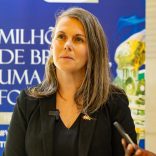Canadian High Commissioner bids farewell following meeting with President of Mozambique
Mozambique: Over $500M raised for Miombo woodland in Southern Africa – President

Photo: Presidente Filipe Nyusi/Facebook
The Mozambican president announced that “more than US$500 million” had been raised at the high-level dialogue on the Miombo Initiative, a network of woodland covering 11 countries in southern Africa, held on Monday in New York.
“We managed to convince the world that we need to protect the Miombo woodland. This requires resources, but we humbly point out that management needs to be with maximum transparency, because the Miombo doesn’t just belong to Mozambique,” said Filipe Nyusi, at a press conference to take stock of his four-day visit to New York.
The visit, in which he also took part in the Summit of the Future promoted by the United Nations, ended with a high-level dialogue on the Miombo Initiative, which brought together dozens of US businessmen who donated to the project and African ministers, including the heads of state of Botswana, Mokgweetsi Masisi, and Malawi, Lazarus Chakwera.
“There it was clear that it’s above US$500 million [the donors’ financial support], but I don’t think the figure will stop there. That’s why I say that a management mechanism needs to be set up, because it’s a regional project,” Nyusi insisted, guaranteeing that “Miombo is now on the world map”.
“It’s a non-political, sustainable and universal project,” he said.
The Miombo woodland covers two million square kilometres and guarantees the livelihoods of more than 300 million inhabitants of 11 countries in southern Africa, including tropical and subtropical grasslands, bushlands and savannahs. It is the largest tropical dry forest ecosystem in the world and is currently facing deforestation problems, among others.
The Mozambican government, which is leading this process, had hoped to mobilise investments to protect the Miombo woodland estimated in the action plan at US$550 million (€495 million), of which US$153 million (€138 million) has been guaranteed since 2022, and has now added a further US$500 million (€450 million).
According to the Mozambican government, which developed the project’s action plan, the planned initiatives are based above all on mapping and recovering the areas most affected by deforestation, but also on monitoring and developing alternative income-generating projects to forest exploitation.
The initiative in defence of Miombo has been promoted in recent years by Filipe Nyusi, who is serving his last term in office and is not running again in the general elections on 9 October. As the time to leave approaches, he assured us that it is a ‘relay race’.
“We run and hand over. Then someone continues (…). Until the last day I have to run, to see if I deliver at an early finish line, because if I leave at a late finish line the one who continues will have to make up for lost time,” he said.
On 17 April, at a conference in Washington, the 11 southern African countries covered by the natural area verbally adopted the Miombo Woodlands Charter of Commitment, which provides for a fund to be set up in Mozambique.
The document includes, in its introduction, “the assumptions for its adoption, recognition of the impact of deforestation, low funding, the need for funding at scale and collaboration between the parties” within the framework of the so-called Miombo initiative.
The second part of this letter refers to the commitment of the parties, emphasising “support for public-private initiatives that stimulate sustainable development”.
The third and final part of the document presents the financing mechanism for the Miombo Initiative, which discusses the need to create a fund to implement the 2022 ‘Maputo Declaration’.
A Swahili word for ‘brachystegia’, miombo is a genus of tree that includes a large number of species and a forest formation that makes up the largest tropical forest ecosystem in Africa, being a source of water, food, shelter, timber, electricity generation and tourism.
The Maputo Declaration on the Miombo Woodland, signed, in addition to Mozambique and Angola, by Botswana, Malawi, the Democratic Republic of Congo, the Republic of Congo, Namibia, South Africa, Tanzania, Zambia and Zimbabwe, establishes priorities for the sustainable management and governance of the natural resources of the Miombo ecosystems from 2022.












Leave a Reply
Be the First to Comment!
You must be logged in to post a comment.
You must be logged in to post a comment.